Psychology of Human Behaviour: Social Media's Impact on Well-being
VerifiedAdded on 2022/11/15
|9
|2219
|359
Report
AI Summary
This report delves into the psychology of human behavior, specifically focusing on the impact of social media usage on mental well-being. It begins with an abstract summarizing the core findings and then introduces the pervasive influence of social networking sites, particularly among young adults. The report critically appraises a study by Hunt et al. (2018), evaluating its methodology, findings, and limitations regarding social media's effects on loneliness and depression. A literature review then explores additional research, including studies by Marino et al. (2018), Marengo et al. (2017), and Chow and Wen (2015), which examine the links between social media use, body image, and depressive symptoms. The report also discusses the impact of time spent on social media and the role of Facebook in causing depression. The conclusion synthesizes the key findings, emphasizing the negative effects of prolonged social media use on psychological health, particularly among young adults, and highlights the need for controlled usage to promote healthy mental development. The report references several key studies to support its arguments.

Running head: PSYCHOLOGY OF HUMAN BEHAVIOUR
TOPIC: PSYCHOLOGY OF HUMAN BEHAVIOUR
Name of the Student:
Name of the University:
Author Note:
TOPIC: PSYCHOLOGY OF HUMAN BEHAVIOUR
Name of the Student:
Name of the University:
Author Note:
Paraphrase This Document
Need a fresh take? Get an instant paraphrase of this document with our AI Paraphraser
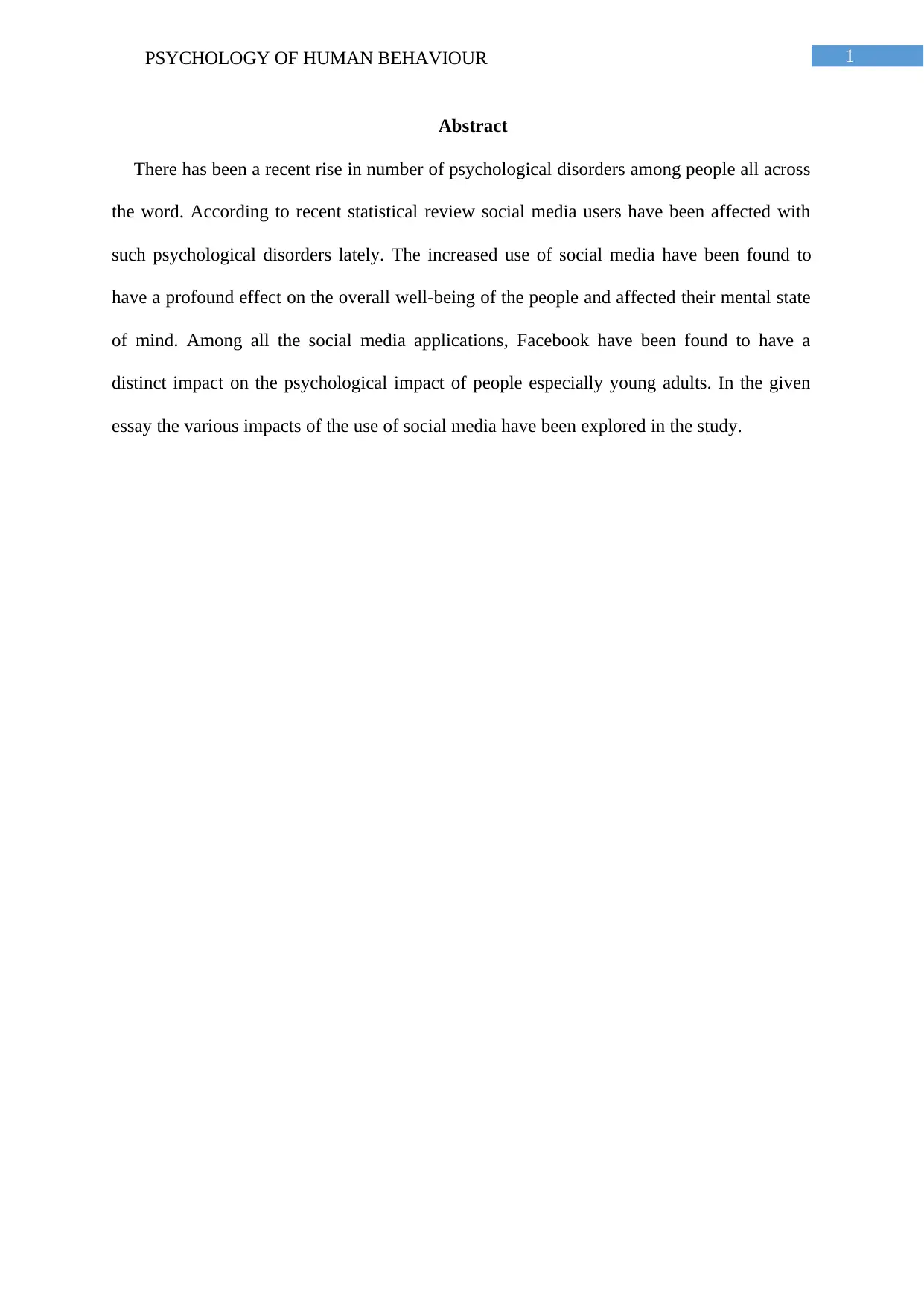
1PSYCHOLOGY OF HUMAN BEHAVIOUR
Abstract
There has been a recent rise in number of psychological disorders among people all across
the word. According to recent statistical review social media users have been affected with
such psychological disorders lately. The increased use of social media have been found to
have a profound effect on the overall well-being of the people and affected their mental state
of mind. Among all the social media applications, Facebook have been found to have a
distinct impact on the psychological impact of people especially young adults. In the given
essay the various impacts of the use of social media have been explored in the study.
Abstract
There has been a recent rise in number of psychological disorders among people all across
the word. According to recent statistical review social media users have been affected with
such psychological disorders lately. The increased use of social media have been found to
have a profound effect on the overall well-being of the people and affected their mental state
of mind. Among all the social media applications, Facebook have been found to have a
distinct impact on the psychological impact of people especially young adults. In the given
essay the various impacts of the use of social media have been explored in the study.

2PSYCHOLOGY OF HUMAN BEHAVIOUR
Introduction
Over the years the use of ever increasing social media followers has been a concern
among people especially young adults and teenagers all across the world. The fact that social
networking sites have been considered as a ubiquitous portion of young adult’s lives is
inevitable (Lin et al., 2016). Among some of the statistical evidences, it has been notices that
almost 68% of the people especially adults have a social account in Facebook. Further 78%
of the people use Snapchat and 71% have used Instagram (Woods & Scott, 2016). It has been
found to impair the psychological thinking of young minds affecting their subjective well-
being which is further known as the self-reported measure of well-being. According to the
tripartite model of Ed Denier, people usually experience quality of lives including both
cognitive judgments and emotional reactions. The following essay is the discussion and a
brief literature review along with the critical appraisal of the negative effects on the ever
increasing social media trend among people.
Critical Appraisal of the paper “ Hunt, M. G., Marx, R., Lipson, C., & Young, J.
(2018). No more FOMO: Limiting social media decreases loneliness and
depression. Journal of Social and Clinical Psychology, 37(10), 751-768.”
The study which has been done by the author has explored the varied effects of increased
use of social media among people. The current study has been designed for a rigorous as well
as ecologically valid and experimental study regarding the impact of well-being of the
multiple use of SNS or social networking sites platforms for an extended period of time
(Hunt et al., 2018). Thus the research question has been aligned to the subject of study and
well justified. Moreover, the research design of the study along with the data collection
procedures, the choice of the inclusion and exclusion criteria has done well clarified by the
author. The varied surveys carried to addressing the social support, the fear of missed out,
Introduction
Over the years the use of ever increasing social media followers has been a concern
among people especially young adults and teenagers all across the world. The fact that social
networking sites have been considered as a ubiquitous portion of young adult’s lives is
inevitable (Lin et al., 2016). Among some of the statistical evidences, it has been notices that
almost 68% of the people especially adults have a social account in Facebook. Further 78%
of the people use Snapchat and 71% have used Instagram (Woods & Scott, 2016). It has been
found to impair the psychological thinking of young minds affecting their subjective well-
being which is further known as the self-reported measure of well-being. According to the
tripartite model of Ed Denier, people usually experience quality of lives including both
cognitive judgments and emotional reactions. The following essay is the discussion and a
brief literature review along with the critical appraisal of the negative effects on the ever
increasing social media trend among people.
Critical Appraisal of the paper “ Hunt, M. G., Marx, R., Lipson, C., & Young, J.
(2018). No more FOMO: Limiting social media decreases loneliness and
depression. Journal of Social and Clinical Psychology, 37(10), 751-768.”
The study which has been done by the author has explored the varied effects of increased
use of social media among people. The current study has been designed for a rigorous as well
as ecologically valid and experimental study regarding the impact of well-being of the
multiple use of SNS or social networking sites platforms for an extended period of time
(Hunt et al., 2018). Thus the research question has been aligned to the subject of study and
well justified. Moreover, the research design of the study along with the data collection
procedures, the choice of the inclusion and exclusion criteria has done well clarified by the
author. The varied surveys carried to addressing the social support, the fear of missed out,
⊘ This is a preview!⊘
Do you want full access?
Subscribe today to unlock all pages.

Trusted by 1+ million students worldwide
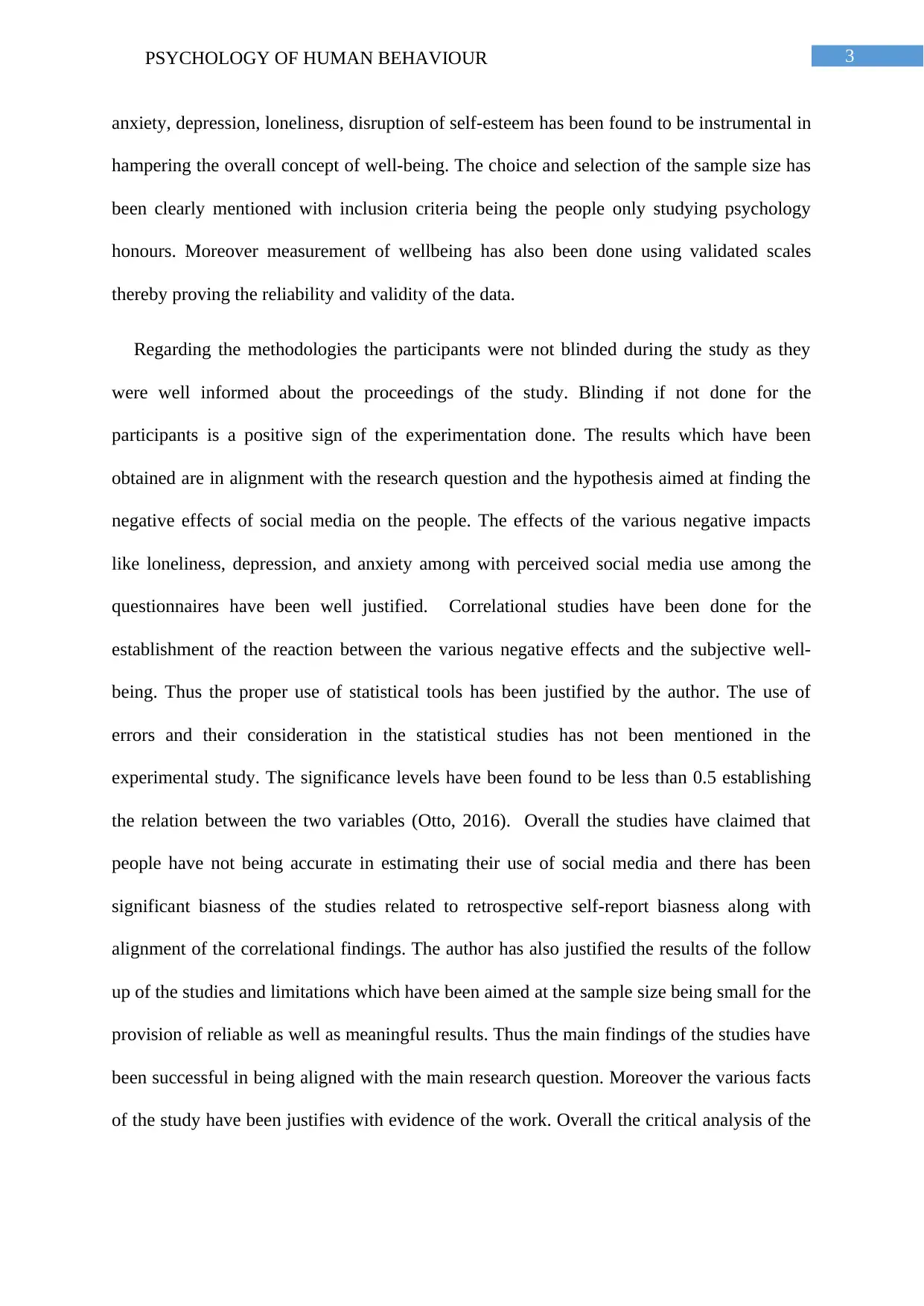
3PSYCHOLOGY OF HUMAN BEHAVIOUR
anxiety, depression, loneliness, disruption of self-esteem has been found to be instrumental in
hampering the overall concept of well-being. The choice and selection of the sample size has
been clearly mentioned with inclusion criteria being the people only studying psychology
honours. Moreover measurement of wellbeing has also been done using validated scales
thereby proving the reliability and validity of the data.
Regarding the methodologies the participants were not blinded during the study as they
were well informed about the proceedings of the study. Blinding if not done for the
participants is a positive sign of the experimentation done. The results which have been
obtained are in alignment with the research question and the hypothesis aimed at finding the
negative effects of social media on the people. The effects of the various negative impacts
like loneliness, depression, and anxiety among with perceived social media use among the
questionnaires have been well justified. Correlational studies have been done for the
establishment of the reaction between the various negative effects and the subjective well-
being. Thus the proper use of statistical tools has been justified by the author. The use of
errors and their consideration in the statistical studies has not been mentioned in the
experimental study. The significance levels have been found to be less than 0.5 establishing
the relation between the two variables (Otto, 2016). Overall the studies have claimed that
people have not being accurate in estimating their use of social media and there has been
significant biasness of the studies related to retrospective self-report biasness along with
alignment of the correlational findings. The author has also justified the results of the follow
up of the studies and limitations which have been aimed at the sample size being small for the
provision of reliable as well as meaningful results. Thus the main findings of the studies have
been successful in being aligned with the main research question. Moreover the various facts
of the study have been justifies with evidence of the work. Overall the critical analysis of the
anxiety, depression, loneliness, disruption of self-esteem has been found to be instrumental in
hampering the overall concept of well-being. The choice and selection of the sample size has
been clearly mentioned with inclusion criteria being the people only studying psychology
honours. Moreover measurement of wellbeing has also been done using validated scales
thereby proving the reliability and validity of the data.
Regarding the methodologies the participants were not blinded during the study as they
were well informed about the proceedings of the study. Blinding if not done for the
participants is a positive sign of the experimentation done. The results which have been
obtained are in alignment with the research question and the hypothesis aimed at finding the
negative effects of social media on the people. The effects of the various negative impacts
like loneliness, depression, and anxiety among with perceived social media use among the
questionnaires have been well justified. Correlational studies have been done for the
establishment of the reaction between the various negative effects and the subjective well-
being. Thus the proper use of statistical tools has been justified by the author. The use of
errors and their consideration in the statistical studies has not been mentioned in the
experimental study. The significance levels have been found to be less than 0.5 establishing
the relation between the two variables (Otto, 2016). Overall the studies have claimed that
people have not being accurate in estimating their use of social media and there has been
significant biasness of the studies related to retrospective self-report biasness along with
alignment of the correlational findings. The author has also justified the results of the follow
up of the studies and limitations which have been aimed at the sample size being small for the
provision of reliable as well as meaningful results. Thus the main findings of the studies have
been successful in being aligned with the main research question. Moreover the various facts
of the study have been justifies with evidence of the work. Overall the critical analysis of the
Paraphrase This Document
Need a fresh take? Get an instant paraphrase of this document with our AI Paraphraser
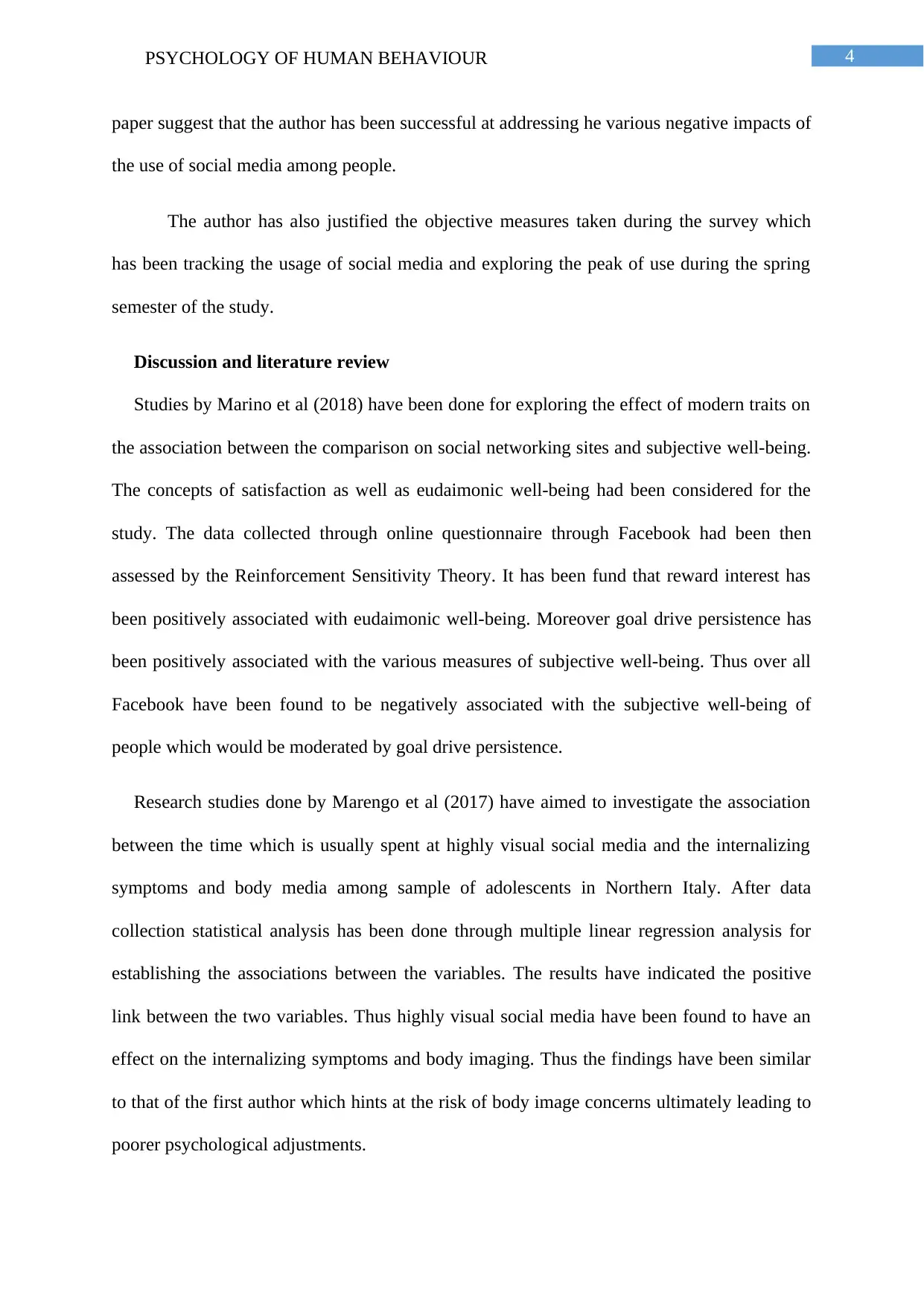
4PSYCHOLOGY OF HUMAN BEHAVIOUR
paper suggest that the author has been successful at addressing he various negative impacts of
the use of social media among people.
The author has also justified the objective measures taken during the survey which
has been tracking the usage of social media and exploring the peak of use during the spring
semester of the study.
Discussion and literature review
Studies by Marino et al (2018) have been done for exploring the effect of modern traits on
the association between the comparison on social networking sites and subjective well-being.
The concepts of satisfaction as well as eudaimonic well-being had been considered for the
study. The data collected through online questionnaire through Facebook had been then
assessed by the Reinforcement Sensitivity Theory. It has been fund that reward interest has
been positively associated with eudaimonic well-being. Moreover goal drive persistence has
been positively associated with the various measures of subjective well-being. Thus over all
Facebook have been found to be negatively associated with the subjective well-being of
people which would be moderated by goal drive persistence.
Research studies done by Marengo et al (2017) have aimed to investigate the association
between the time which is usually spent at highly visual social media and the internalizing
symptoms and body media among sample of adolescents in Northern Italy. After data
collection statistical analysis has been done through multiple linear regression analysis for
establishing the associations between the variables. The results have indicated the positive
link between the two variables. Thus highly visual social media have been found to have an
effect on the internalizing symptoms and body imaging. Thus the findings have been similar
to that of the first author which hints at the risk of body image concerns ultimately leading to
poorer psychological adjustments.
paper suggest that the author has been successful at addressing he various negative impacts of
the use of social media among people.
The author has also justified the objective measures taken during the survey which
has been tracking the usage of social media and exploring the peak of use during the spring
semester of the study.
Discussion and literature review
Studies by Marino et al (2018) have been done for exploring the effect of modern traits on
the association between the comparison on social networking sites and subjective well-being.
The concepts of satisfaction as well as eudaimonic well-being had been considered for the
study. The data collected through online questionnaire through Facebook had been then
assessed by the Reinforcement Sensitivity Theory. It has been fund that reward interest has
been positively associated with eudaimonic well-being. Moreover goal drive persistence has
been positively associated with the various measures of subjective well-being. Thus over all
Facebook have been found to be negatively associated with the subjective well-being of
people which would be moderated by goal drive persistence.
Research studies done by Marengo et al (2017) have aimed to investigate the association
between the time which is usually spent at highly visual social media and the internalizing
symptoms and body media among sample of adolescents in Northern Italy. After data
collection statistical analysis has been done through multiple linear regression analysis for
establishing the associations between the variables. The results have indicated the positive
link between the two variables. Thus highly visual social media have been found to have an
effect on the internalizing symptoms and body imaging. Thus the findings have been similar
to that of the first author which hints at the risk of body image concerns ultimately leading to
poorer psychological adjustments.
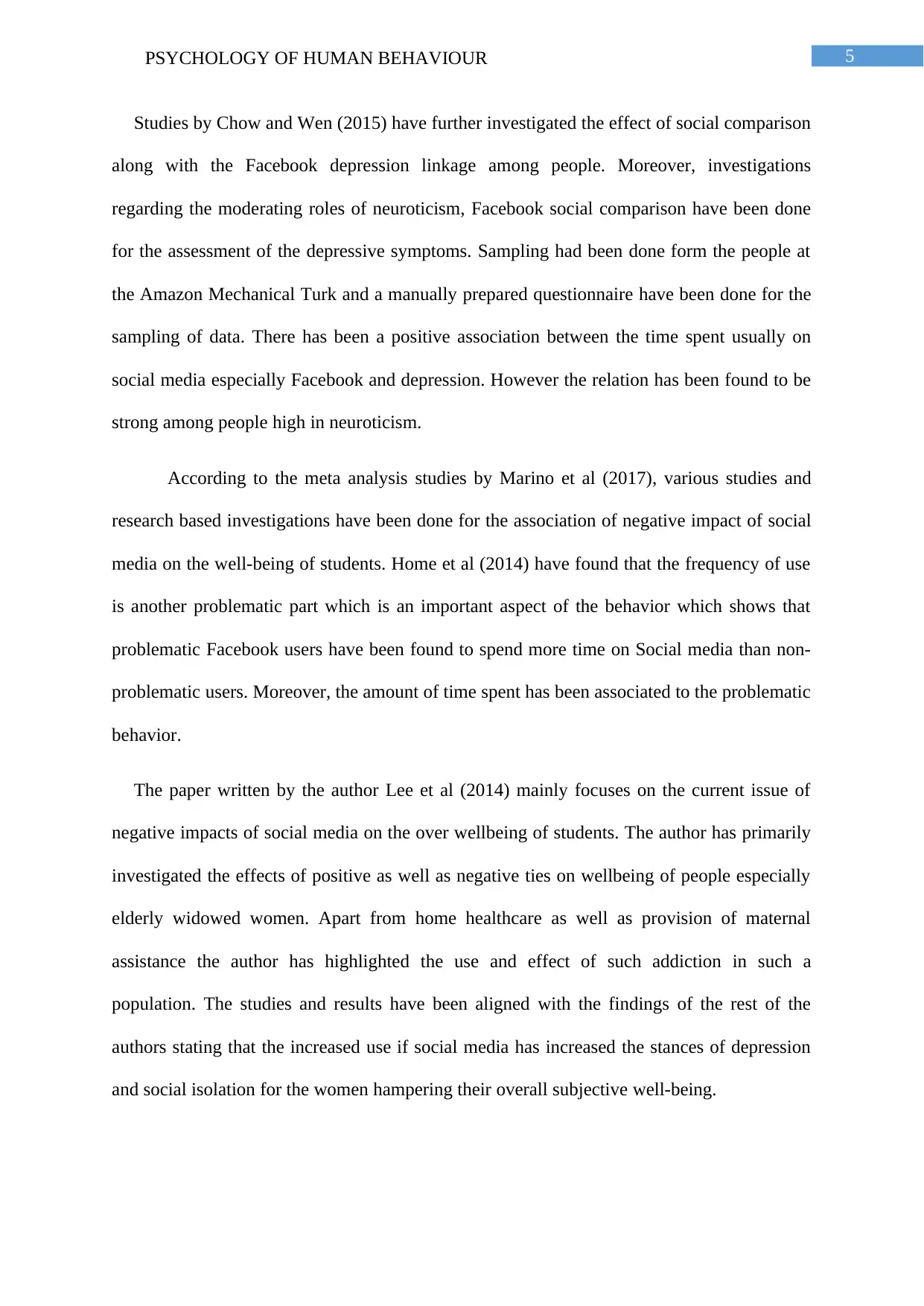
5PSYCHOLOGY OF HUMAN BEHAVIOUR
Studies by Chow and Wen (2015) have further investigated the effect of social comparison
along with the Facebook depression linkage among people. Moreover, investigations
regarding the moderating roles of neuroticism, Facebook social comparison have been done
for the assessment of the depressive symptoms. Sampling had been done form the people at
the Amazon Mechanical Turk and a manually prepared questionnaire have been done for the
sampling of data. There has been a positive association between the time spent usually on
social media especially Facebook and depression. However the relation has been found to be
strong among people high in neuroticism.
According to the meta analysis studies by Marino et al (2017), various studies and
research based investigations have been done for the association of negative impact of social
media on the well-being of students. Home et al (2014) have found that the frequency of use
is another problematic part which is an important aspect of the behavior which shows that
problematic Facebook users have been found to spend more time on Social media than non-
problematic users. Moreover, the amount of time spent has been associated to the problematic
behavior.
The paper written by the author Lee et al (2014) mainly focuses on the current issue of
negative impacts of social media on the over wellbeing of students. The author has primarily
investigated the effects of positive as well as negative ties on wellbeing of people especially
elderly widowed women. Apart from home healthcare as well as provision of maternal
assistance the author has highlighted the use and effect of such addiction in such a
population. The studies and results have been aligned with the findings of the rest of the
authors stating that the increased use if social media has increased the stances of depression
and social isolation for the women hampering their overall subjective well-being.
Studies by Chow and Wen (2015) have further investigated the effect of social comparison
along with the Facebook depression linkage among people. Moreover, investigations
regarding the moderating roles of neuroticism, Facebook social comparison have been done
for the assessment of the depressive symptoms. Sampling had been done form the people at
the Amazon Mechanical Turk and a manually prepared questionnaire have been done for the
sampling of data. There has been a positive association between the time spent usually on
social media especially Facebook and depression. However the relation has been found to be
strong among people high in neuroticism.
According to the meta analysis studies by Marino et al (2017), various studies and
research based investigations have been done for the association of negative impact of social
media on the well-being of students. Home et al (2014) have found that the frequency of use
is another problematic part which is an important aspect of the behavior which shows that
problematic Facebook users have been found to spend more time on Social media than non-
problematic users. Moreover, the amount of time spent has been associated to the problematic
behavior.
The paper written by the author Lee et al (2014) mainly focuses on the current issue of
negative impacts of social media on the over wellbeing of students. The author has primarily
investigated the effects of positive as well as negative ties on wellbeing of people especially
elderly widowed women. Apart from home healthcare as well as provision of maternal
assistance the author has highlighted the use and effect of such addiction in such a
population. The studies and results have been aligned with the findings of the rest of the
authors stating that the increased use if social media has increased the stances of depression
and social isolation for the women hampering their overall subjective well-being.
⊘ This is a preview!⊘
Do you want full access?
Subscribe today to unlock all pages.

Trusted by 1+ million students worldwide
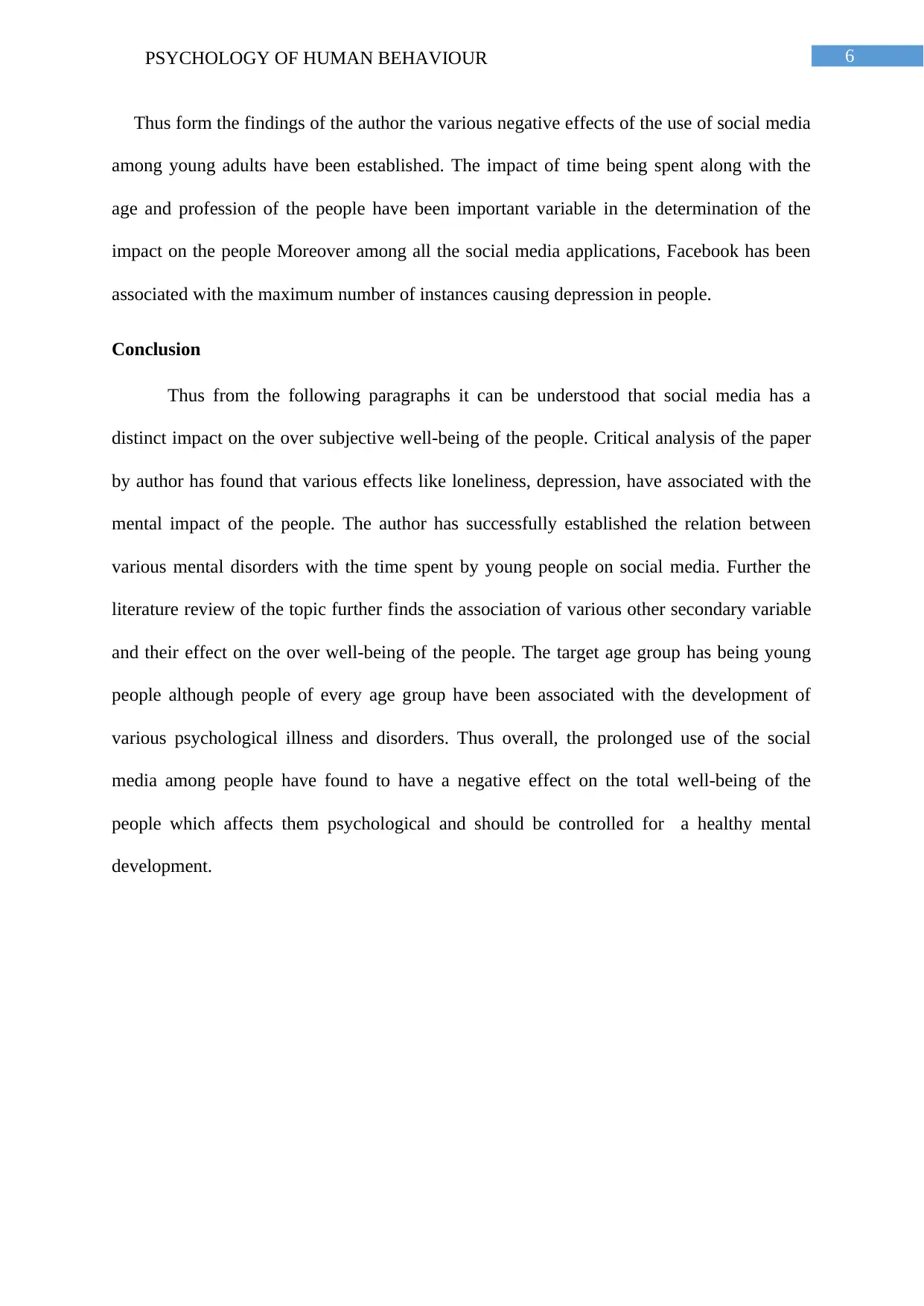
6PSYCHOLOGY OF HUMAN BEHAVIOUR
Thus form the findings of the author the various negative effects of the use of social media
among young adults have been established. The impact of time being spent along with the
age and profession of the people have been important variable in the determination of the
impact on the people Moreover among all the social media applications, Facebook has been
associated with the maximum number of instances causing depression in people.
Conclusion
Thus from the following paragraphs it can be understood that social media has a
distinct impact on the over subjective well-being of the people. Critical analysis of the paper
by author has found that various effects like loneliness, depression, have associated with the
mental impact of the people. The author has successfully established the relation between
various mental disorders with the time spent by young people on social media. Further the
literature review of the topic further finds the association of various other secondary variable
and their effect on the over well-being of the people. The target age group has being young
people although people of every age group have been associated with the development of
various psychological illness and disorders. Thus overall, the prolonged use of the social
media among people have found to have a negative effect on the total well-being of the
people which affects them psychological and should be controlled for a healthy mental
development.
Thus form the findings of the author the various negative effects of the use of social media
among young adults have been established. The impact of time being spent along with the
age and profession of the people have been important variable in the determination of the
impact on the people Moreover among all the social media applications, Facebook has been
associated with the maximum number of instances causing depression in people.
Conclusion
Thus from the following paragraphs it can be understood that social media has a
distinct impact on the over subjective well-being of the people. Critical analysis of the paper
by author has found that various effects like loneliness, depression, have associated with the
mental impact of the people. The author has successfully established the relation between
various mental disorders with the time spent by young people on social media. Further the
literature review of the topic further finds the association of various other secondary variable
and their effect on the over well-being of the people. The target age group has being young
people although people of every age group have been associated with the development of
various psychological illness and disorders. Thus overall, the prolonged use of the social
media among people have found to have a negative effect on the total well-being of the
people which affects them psychological and should be controlled for a healthy mental
development.
Paraphrase This Document
Need a fresh take? Get an instant paraphrase of this document with our AI Paraphraser
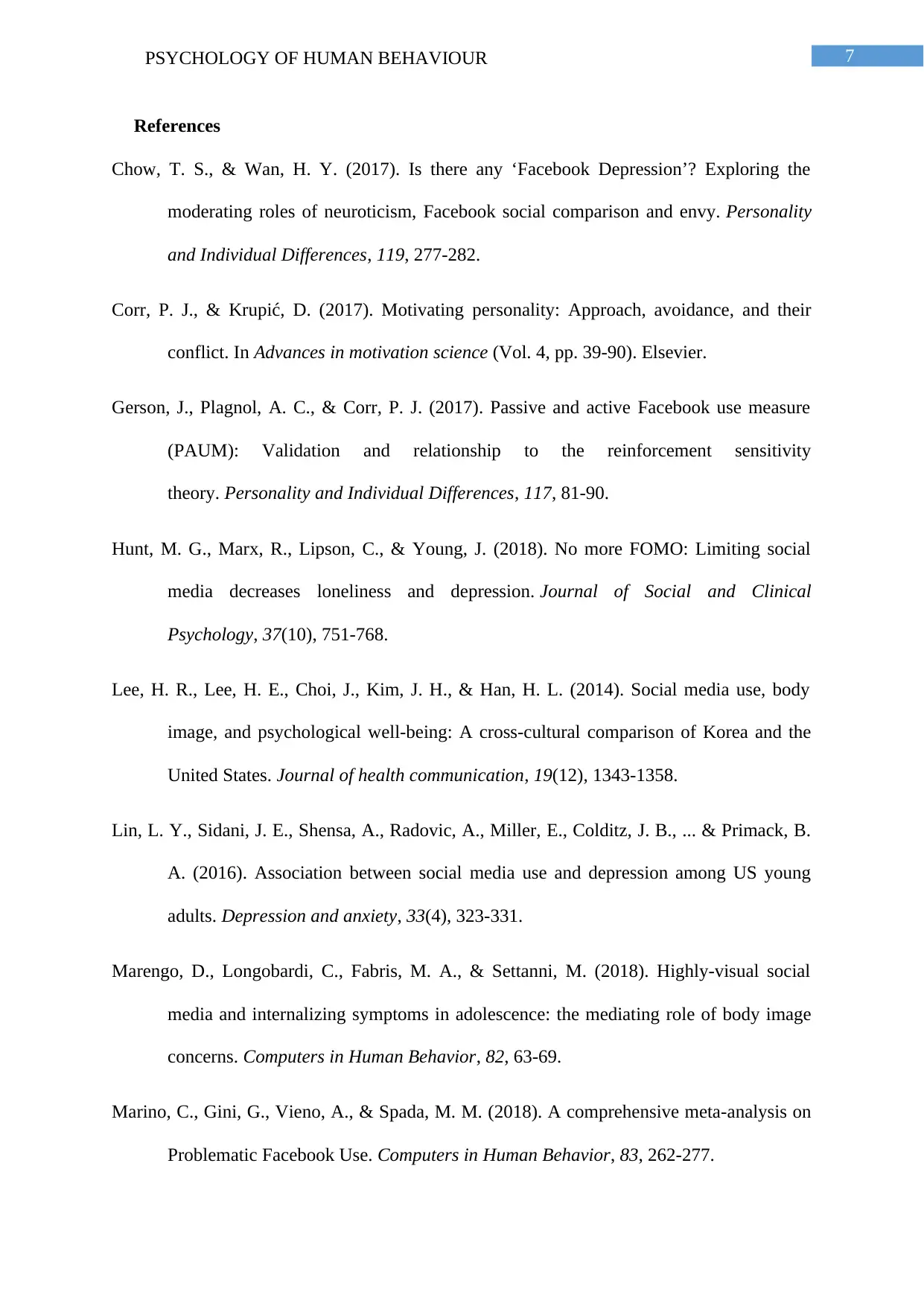
7PSYCHOLOGY OF HUMAN BEHAVIOUR
References
Chow, T. S., & Wan, H. Y. (2017). Is there any ‘Facebook Depression’? Exploring the
moderating roles of neuroticism, Facebook social comparison and envy. Personality
and Individual Differences, 119, 277-282.
Corr, P. J., & Krupić, D. (2017). Motivating personality: Approach, avoidance, and their
conflict. In Advances in motivation science (Vol. 4, pp. 39-90). Elsevier.
Gerson, J., Plagnol, A. C., & Corr, P. J. (2017). Passive and active Facebook use measure
(PAUM): Validation and relationship to the reinforcement sensitivity
theory. Personality and Individual Differences, 117, 81-90.
Hunt, M. G., Marx, R., Lipson, C., & Young, J. (2018). No more FOMO: Limiting social
media decreases loneliness and depression. Journal of Social and Clinical
Psychology, 37(10), 751-768.
Lee, H. R., Lee, H. E., Choi, J., Kim, J. H., & Han, H. L. (2014). Social media use, body
image, and psychological well-being: A cross-cultural comparison of Korea and the
United States. Journal of health communication, 19(12), 1343-1358.
Lin, L. Y., Sidani, J. E., Shensa, A., Radovic, A., Miller, E., Colditz, J. B., ... & Primack, B.
A. (2016). Association between social media use and depression among US young
adults. Depression and anxiety, 33(4), 323-331.
Marengo, D., Longobardi, C., Fabris, M. A., & Settanni, M. (2018). Highly-visual social
media and internalizing symptoms in adolescence: the mediating role of body image
concerns. Computers in Human Behavior, 82, 63-69.
Marino, C., Gini, G., Vieno, A., & Spada, M. M. (2018). A comprehensive meta-analysis on
Problematic Facebook Use. Computers in Human Behavior, 83, 262-277.
References
Chow, T. S., & Wan, H. Y. (2017). Is there any ‘Facebook Depression’? Exploring the
moderating roles of neuroticism, Facebook social comparison and envy. Personality
and Individual Differences, 119, 277-282.
Corr, P. J., & Krupić, D. (2017). Motivating personality: Approach, avoidance, and their
conflict. In Advances in motivation science (Vol. 4, pp. 39-90). Elsevier.
Gerson, J., Plagnol, A. C., & Corr, P. J. (2017). Passive and active Facebook use measure
(PAUM): Validation and relationship to the reinforcement sensitivity
theory. Personality and Individual Differences, 117, 81-90.
Hunt, M. G., Marx, R., Lipson, C., & Young, J. (2018). No more FOMO: Limiting social
media decreases loneliness and depression. Journal of Social and Clinical
Psychology, 37(10), 751-768.
Lee, H. R., Lee, H. E., Choi, J., Kim, J. H., & Han, H. L. (2014). Social media use, body
image, and psychological well-being: A cross-cultural comparison of Korea and the
United States. Journal of health communication, 19(12), 1343-1358.
Lin, L. Y., Sidani, J. E., Shensa, A., Radovic, A., Miller, E., Colditz, J. B., ... & Primack, B.
A. (2016). Association between social media use and depression among US young
adults. Depression and anxiety, 33(4), 323-331.
Marengo, D., Longobardi, C., Fabris, M. A., & Settanni, M. (2018). Highly-visual social
media and internalizing symptoms in adolescence: the mediating role of body image
concerns. Computers in Human Behavior, 82, 63-69.
Marino, C., Gini, G., Vieno, A., & Spada, M. M. (2018). A comprehensive meta-analysis on
Problematic Facebook Use. Computers in Human Behavior, 83, 262-277.

8PSYCHOLOGY OF HUMAN BEHAVIOUR
Otto, M. (2016). Chemometrics: statistics and computer application in analytical chemistry.
John Wiley & Sons.
Woods, H. C., & Scott, H. (2016). # Sleepyteens: Social media use in adolescence is
associated with poor sleep quality, anxiety, depression and low self-esteem. Journal
of adolescence, 51, 41-49.
Otto, M. (2016). Chemometrics: statistics and computer application in analytical chemistry.
John Wiley & Sons.
Woods, H. C., & Scott, H. (2016). # Sleepyteens: Social media use in adolescence is
associated with poor sleep quality, anxiety, depression and low self-esteem. Journal
of adolescence, 51, 41-49.
⊘ This is a preview!⊘
Do you want full access?
Subscribe today to unlock all pages.

Trusted by 1+ million students worldwide
1 out of 9
Related Documents
Your All-in-One AI-Powered Toolkit for Academic Success.
+13062052269
info@desklib.com
Available 24*7 on WhatsApp / Email
![[object Object]](/_next/static/media/star-bottom.7253800d.svg)
Unlock your academic potential
Copyright © 2020–2026 A2Z Services. All Rights Reserved. Developed and managed by ZUCOL.





